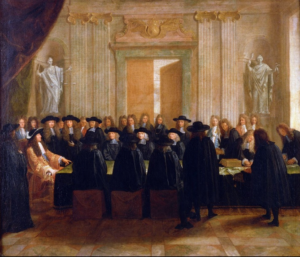Louis XIV governed as an absolute monarch – he was the ultimate head of state, ruling by what he perceived as divine right (i.e. appointed by God). Although he was surrounded by ministers, Louis XIV wielded ultimate power and could hire, fire, and ignore ministers as he saw fit.
Nevertheless, administering a huge kingdom while fighting foreign wars, building Versailles, and collecting mistresses, meant that the head of Europe’s dominant military force also had to be the head of an administrative army. This overview of the King’s domestic policy gives an insight into the day-to-day running of France, from its economy down to its judicial system.

Anonymous, Louis XIV tenant les sceaux en présence des conseillers d’Etat et des maîtres des Requêtes. © Photo RMN-Grand Palais (Château de Versailles) MV 5638.
The King at war
Louis XIV’s reign was punctuated by frequent conflicts, inside and outside France. In the Siècle de Louis XIV, Voltaire provides highly detailed, almost day-by-day accounts of the Fronde, the War of the Spanish Succession, and the Franco-Dutch war, among others. However, success on the battlefield was not simply a question of territorial gains.
Key conflicts
- An overview of Louis XIV’s wars and military might
- Trouble at home: quelling the Fronde
- Landgrabbing: the War of Devolution
- The Dutch War
- The War of the Palatinate (also known as the Nine Years’ War)
- The War of the Spanish Succession
